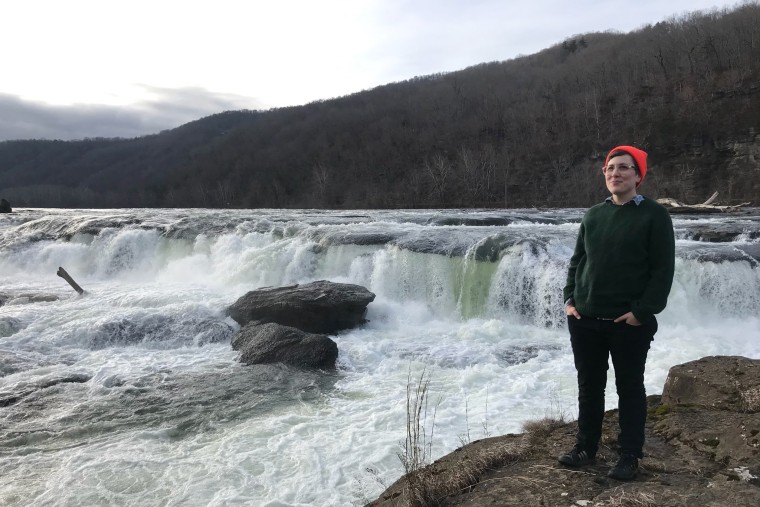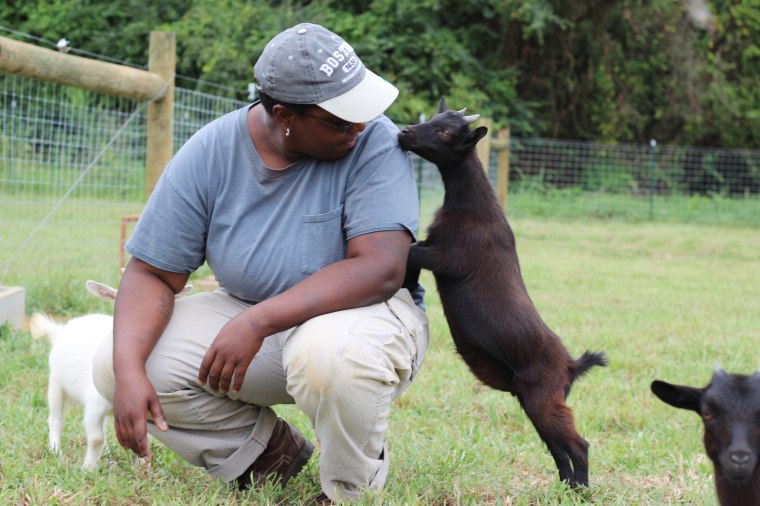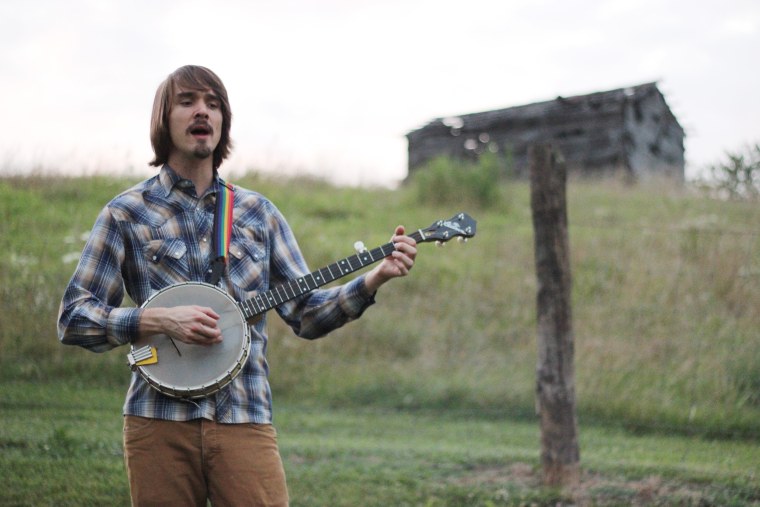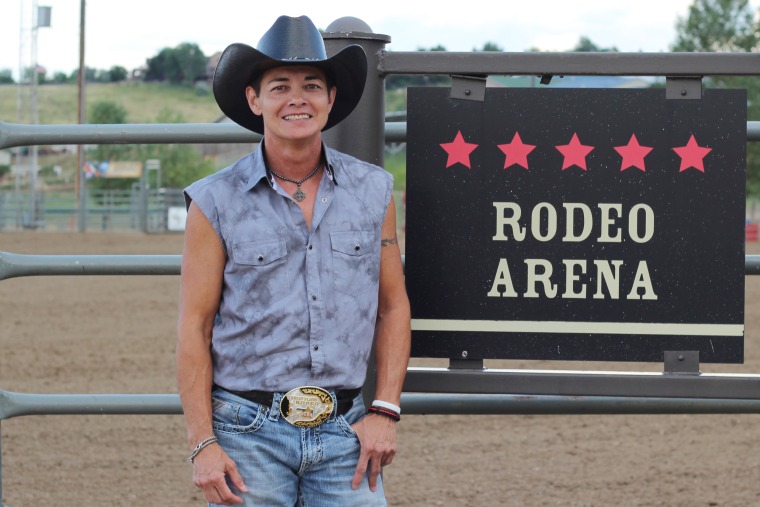When Rae Garringer was growing up on a farm in southeastern West Virginia in the 1980s and the 1990s, LGBTQ people — both real or fictional — were nowhere to be found.
“I grew up without TV, and it was mostly pre-internet, so I just didn’t know any queer people,” Garringer, 35, told NBC News. “I never met queer people my age, and I wasn’t seeing queer representation in the place that I existed; I just think I didn’t even realize that it was kind of an option.”
It wasn’t until Garringer, who uses nonbinary they/them pronouns, moved away to Massachusetts for college in 2003 that they met other LGBTQ people and embraced their sexual orientation and gender identity. After living away for several years, first at university and then in liberal Austin, Texas, Garringer questioned whether they could live openly and find a queer community of friends back home. Then in 2011, after eight years away, Garringer headed back to the farm for a job opportunity and to be closer to family.

Garringer, who now lives in neighboring Kentucky, said their move back to West Virginia was “healing” and filled with “joy.” But while queerness was not as hidden as it had been, it was still far from easily visible.
“I was just really frustrated that it was so hard to find rural queer stories and histories, and it was also very hard to find each other in small-town spaces,” Garringer said.
So in 2013, feeling a need to find a sense of community, Garringer had an idea. They saved $200 to buy a tape recorder and set out to document the diverse experiences of LGBTQ individuals living in rural towns across the United States. Those interviews turned into Country Queers, a multimedia, oral-history project. The stories collected by Garringer over the years have been shared on the Country Queers website and Instagram page, and starting June 30, the new “Country Queers” podcast will debut on Apple Podcasts, Spotify and Stitcher.
The ‘monotony and fabulosity’ of rural life
For the past seven years, Garringer has interviewed 65 people from 15 states — from Arizona all the way to Vermont — and has collaborated with queer organizations including the Two Spirit National Cultural Exchange, the Kansas Queer Youth Network and the International Gay Rodeo Association. With the help of a Kickstarter campaign, Garringer was able to buy a camera and take a long road trip to six states in the summer of 2014, driving a total of 7,000 miles to interview 30 people in 30 days.
In a piece Garringer wrote for Scalawag, a Southern storytelling website, they said their aim is to share stories that portray “the full contradictory glory that is human life.”
“I believe in the power of those of us living an experience daily sharing stories of the messy complicated joy, pain, monotony and fabulosity of rural and small town queer life,” Garringer wrote.

Early on in the project, it was clear to Garringer that rural queer experiences are not monolithic, which is why Country Queers — first as an oral history project and now as a podcast — aims to document rural, queer people of different races, ages, religions, socioeconomic backgrounds and occupations.
Garringer serves as the "Country Queers” podcast’s host, producer and lead editor. They have one additional person helping with production and a group of editorial advisers including journalists, professors and activists.
The podcast’s first season, which starts Tuesday, is slated to have nine episodes, each featuring a different individual’s oral history interview.

“It’s not going to be a highly narrated podcast with a lot of interjections from me,” Garringer said. “It’s just mostly going to be excerpts from someone sharing some of their life story.”
Since its inception, Country Queers has been powered by crowdfunding, grant money and volunteers who have helped Garringer transcribe the interviews. А grant from the Kentucky Foundation for Women in June 2019 helped fund a Country Queers traveling gallery exhibit. Some of that grant money, as well as a January 2020 Kickstarter campaign, enabled Garringer to quit their job to focus on producing the “Country Queers” podcast.
Coming out as ‘Two Spirit’
Episode 1 of the “Country Queers” podcast, which airs July 7, features Crisosto Apache, 49, a Two Spirit advocate, writer and English professor currently living in Colorado. Apache grew up on the Mescalero Apache reservation in New Mexico in a community of no more than 6,000 people, they said. Apache, who uses they/them pronouns, was the first one in their family to go to college and get an advanced degree.
Two Spirit is an umbrella term used by North American indigenous communities to describe a person “whose body simultaneously houses a masculine spirit and a feminine spirit,” according to an educational booklet created by the Minnesota Indian Women’s Sexual Assault Coalition. Apache said their encounter with the Two Spirit Society of Denver changed their life and their understanding of being gay. While the understanding of the term Two Spirit can vary from one tribal community to another, the term typically encompasses gender and sexual minorities.
“When I tell my story, I tell people that I came out twice: one is the Western sense of being gay, and the second was more of a cultural sense of being gay,” Apache told NBC News. “When I have conversations with people back home, there was a sort of fear or a kind of apprehension when I said I was gay, because in their concept, they think of the gay person as somebody not living under reservation, who didn’t have any responsible ties to the cultural aspect of the tribe, which I thought was kind of an interesting perception, but it wasn’t until I declared that I was coming out as a Two Spirit person that that connection made more sense"
‘I had to go back to the mountains’
Hermelinda Cortés, who serves as an editorial adviser for the new podcast, was featured in one of Country Queers’ Instagram takeovers. Cortés grew up in Virginia's Shenandoah Valley, raised by a Mexican immigrant father and a white, working-class mother from West Virginia. Her parents, as well as much of her extended family, worked in a poultry plant.
Cortés’ paternal side of the family came from Florencia, Mexico, another small, agricultural town. Over the course of her childhood, she saw how many people from Florencia migrated to the Shenandoah Valley. She would spend much of her time teaching people English, informally, and helping people who don’t speak English fill out a variety of forms. She remembers how her father was working on getting U.S. citizenship when she was a child.
“I felt I had to grow up really fast,” Cortés said. “I’m the oldest of three girls; I’m the oldest of 30-some cousins. We’re just kind of always in this position of kind of overseeing and caretaking for people who were living between multiple worlds.”
Eventually in the early 2010s, after years of living in Richmond, Virginia, Cortés moved back to the Shenandoah Valley with her son. Some of the major themes explored in the Country Queers interviews is the emotional whirlwind of leaving a hometown, returning to one’s roots and the childhood connection to family land.
“Never thought in a million years that I was going to come back, and then like flash forward by 2010, every time I was kind of driving over the mountain I would just like sob,” Cortés said. “I couldn’t really pinpoint what was happening emotionally and spiritually and just for having this kind of feeling in my stomach that I had to go back to the mountains, and it felt very visceral.”
Cortés became involved with the Country Queers project in 2014, when she was working as an organizer for Southerners on New Ground, a social justice organization that supports LGBTQ communities in the South. At the time, Cortés was working on a report that focused on organizing strategies for queer communities in small towns.
Garringer said they hope the “Country Queers” podcast, as well as the existing oral history project, will help people rethink their preconceived notions about both LGBTQ people and rural America.
“Part of what this project is doing,” Garringer said, is questioning “where queerness shows up and can even thrive” and “who exists in rural spaces and feels at home in rural spaces.”

